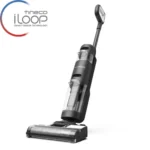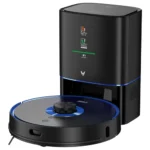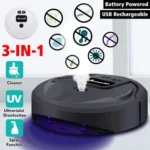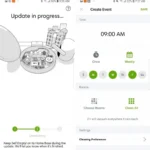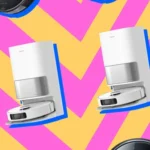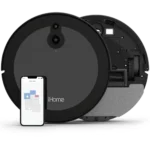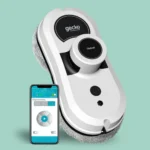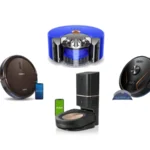Have you ever experienced sneezing or coughing while cleaning your house? Or worry about the dirt and pollutants present in your indoor air? With the advancements in technology, there is a solution to this problem – smart vacuum cleaners with high-performance filtration systems. These advanced devices not only remove dust, dirt, and debris from floors and carpets but also ensure enhanced indoor air quality and a healthier living environment. In this article, we’ll dive into the benefits of having a smart vacuum cleaner with a good filtration system, how it works, and how to choose the right one for your cleaning needs. So, sit back, relax, and let’s explore the world of smart vacuum cleaners!
What is a Smart Vacuum Cleaner?
Smart vacuum cleaners are the advanced types of vacuum cleaners designed for modern homes. They are equipped with intelligent technologies such as sensors, programming, and Wi-Fi connectivity that enable them to clean homes autonomously, without much human intervention. These smart devices have revolutionized the way people clean their homes by allowing them to remotely manage the cleaning process from their smartphones or tablets.
Smart vacuum cleaners come in different shapes, sizes, and models. Some are designed for cleaning carpets, while others are made for hardwood floors. They can also be programmed to clean specific areas of the home, or be set to clean the entire house automatically. Some models even have features that allow them to climb stairs or avoid obstacles, making cleaning much more efficient.
One of the most important aspects of a smart vacuum cleaner is its advanced filtration system. These high-performance filtration systems are designed to capture even the smallest particles of dust, dirt, and allergens, keeping your home clean and healthy. The filtration system in a smart vacuum cleaner can be made up of multiple layers of filtration, including pre-filters, HEPA filters, and post-filters that work together to ensure that the air in your home is clean and free of pollutants.
To ensure that these smart vacuum cleaners work effectively and efficiently, they require maintenance and proper cleaning. It is important to clean the filters regularly to keep the device working optimally. Additionally, some smart vacuum cleaners come with different noise levels, so it’s essential to compare and choose a model with a low noise level for a quieter home cleaning experience. You can learn more about the importance of noise levels in smart vacuum cleaners here.
Smart vacuum cleaners are the future of home cleaning. With their advanced technologies and high-performance filtration systems, they offer reliable and efficient cleaning performance, make cleaning easy, and help keep indoor air quality high. If you want to learn more about the benefits of smart vacuum filtration systems, you can read our detailed article about the topic here, or if you’re interested in how HEPA filters work, check out our article here.
What is a High-Performance Filtration System?
A high-performance filtration system is an essential feature found in modern smart vacuum cleaners. It is a system designed to capture and remove microscopic particles such as dirt, dust, allergens, and pollutants from indoor air. It is particularly beneficial to people who suffer from allergies and respiratory problems since it can drastically reduce the number of airborne particles that trigger their symptoms.
Aside from improving indoor air quality, a high-performance filtration system also helps to maintain the vacuum cleaner’s suction performance over time. As more particles accumulate inside the vacuum’s filter, the motor struggles to draw air through the filter, leading to a decrease in suction power. This is why it is crucial to choose a smart vacuum cleaner with a quality filtration system that can efficiently trap and remove dust and allergens without impeding airflow.
One of the most common types of filters found in smart vacuum cleaners is the HEPA filter, which stands for High-Efficiency Particulate Air filter. HEPA filters are made of interlaced glass fibers that can trap up to 99.97% of particles that are 0.3 microns or larger. This makes HEPA filters the gold standard for air filtration and a popular choice for people with allergies or asthma. It is common for smart vacuum cleaners to come equipped with HEPA filters, and some even have multiple stages of filtration to ensure maximum cleaning efficiency.
Not only is a high-performance filtration system essential for maintaining indoor air quality and suction power, but it can also protect your floors and carpets by capturing and containing the debris and particles. This helps to prevent dirt and dust from being reintroduced into the air or settling back onto surfaces after being vacuumed up.
To sum up, a high-performance filtration system is a critical component of modern smart vacuum cleaners that can benefit both you and your home. It traps dust and allergens, improves air quality, helps the vacuum maintain suction power over time, and protects your surfaces from debris. It is worth assessing the filtration technology of various smart vacuums before making a purchase decision. For those interested in reducing noise levels in their smart vacuum, check out our article on how to reduce the noise level smart vacuum. You can also find a comparison of noise levels in smart vacuums on our noise level smart vacuum comparison page.
Benefits of Smart Vacuum Cleaners with Quality Filtration Systems
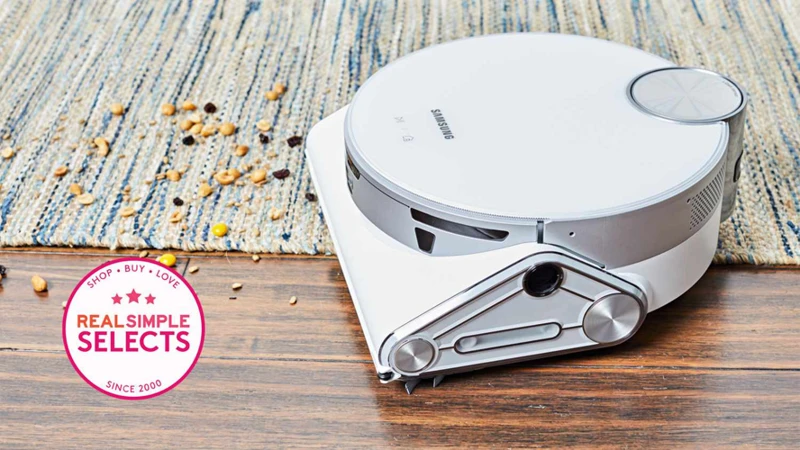
Smart vacuum cleaners with high-performance filtration systems offer several benefits to homeowners. They are becoming increasingly popular as people are becoming more conscious about the air they breathe and the cleanliness of their homes. These advanced vacuum cleaners provide superior cleaning performance, which is particularly important for those who suffer from allergies, asthma, or other respiratory conditions that can be aggravated by poor indoor air quality. Let’s take a closer look at some of the most notable benefits of smart vacuum cleaners with quality filtration systems.
1. Enhanced Indoor Air Quality
One of the primary benefits of using a smart vacuum cleaner with a quality filtration system is that it can improve the indoor air quality of your home. This is particularly essential if you or a family member suffers from allergies or respiratory problems. The filtration system helps to capture and contain dust, dirt, pet hair, and other particles that can pollute the air inside your home. It ensures that only clean and fresh air is released back into the air, reducing the risk of health problems caused by poor indoor air quality.
2. Elimination of Allergens and Pollutants
Smart vacuum cleaners with advanced filtration systems can effectively eliminate allergens and pollutants from your home. They have the ability to capture small dust particles such as mold, bacteria, and dust mites, which are known allergens. This is a significant advantage for people who have allergies, asthma or any other respiratory problems. The filtration system ensures that they breathe clean air and can have a healthier and comfortable home environment.
3. Reduction of Health Risks
A smart vacuum cleaner with a quality filtration system can also help reduce the risk of health issues related to poor air quality. Inhaling dust, dirt, and other pollutants can lead to various health problems such as allergies, asthma attacks, and other respiratory problems. High-performance filtration systems can capture and eliminate these pollutants, thus reducing the risk of health problems for everyone in the home.
4. Protection of Home Surfaces and Fabrics
Smart vacuum cleaners with quality filtration systems can also protect your home surfaces and fabrics from dust and dirt particles. The high-performance filtration system not only cleans the air but also captures and eliminates dirt and dust from surfaces such as carpets, furniture, and floors. This helps to prevent damage to surfaces and fabrics, prolonging their lifespan and keeping your home looking clean and healthy.
5. Reliable and Efficient Cleaning Performance
Smart vacuum cleaners with advanced filtration systems deliver reliable and efficient cleaning performance. These vacuum cleaners have powerful motors and suction capabilities, enabling them to effectively remove dirt, dust, and debris from your floors and carpets. They also have smart sensors and navigation technology, which allows them to navigate around obstacles and clean hard-to-reach areas. This ensures that your home is thoroughly cleaned and free from pollutants.
Smart vacuum cleaners with quality filtration systems provide numerous benefits to homeowners. Enhanced indoor air quality, elimination of allergens and pollutants, reduced health risks, protection of home surfaces and fabrics, and reliable and efficient cleaning performance are just some of the advantages of using a smart vacuum cleaner with a high-performance filtration system. It is essential to choose the right smart vacuum cleaner with advanced filtration technology, considering your cleaning needs and comparing features and options. Additionally, if you’re concerned about noise, don’t hesitate to check out our article on how to reduce the noise level of your smart vacuum cleaner, or our comparison of the best low-noise smart vacuums.
1. Enhanced Indoor Air Quality
An advanced filtration system in a smart vacuum cleaner brings several benefits to your indoor air quality. The filtration system is designed to capture and contain even the smallest particles, including dust, dirt, and allergens. These particles can cause respiratory problems and allergic reactions that can affect the health of you and your family.
Having a smart vacuum cleaner with an advanced filtration system can significantly reduce the amount of airborne particles, thus enhancing indoor air quality. With its improved filtering capabilities, you can be sure that the air you breathe is free from harmful contaminants. It’s especially important for people who suffer from respiratory problems like asthma or allergies.
In addition to removing harmful particles, a smart vacuum cleaner with advanced filtration can also reduce unpleasant odors. With its activated carbon filter, it eliminates pet dander smells, cigarette smoke odors and other bad smells, leaving your indoor air fresh and clean.
Advanced filtration systems in smart vacuum cleaners can reduce your exposure to noise pollution. Repeated exposure to high noise levels can cause stress, fatigue and even hearing loss. Smart vacuum cleaners with a low sound level can provide a quiet, stress-free cleaning experience enabling you to operate it in the background without any disturbance. Having noise reduction technology in smart vacuum cleaners is beneficial if you live in a small apartment or have neighbors in close proximity.
Investing in a smart vacuum cleaner with an advanced filtration system has many health benefits, improving indoor air quality, reducing exposure to noise pollution, and eliminating unpleasant smells in your home. Make sure to consider the high performance filtration system when choosing a smart vacuum cleaner that suits your needs.
2. Elimination of Allergens and Pollutants
One of the most significant benefits of having a smart vacuum cleaner with a good filtration system is the elimination of allergens and pollutants from the indoor environment.
Allergens such as dust mites, pet dander, and pollen are common triggers for asthma and allergy sufferers. These tiny particles are often found in carpets, upholstery, and other fabrics in the home. Traditional vacuum cleaners often stir up these allergens and release them back into the air, which can worsen symptoms for those who are sensitive.
However, a smart vacuum cleaner with a quality filtration system can efficiently trap these particles and prevent them from being recirculated back into the air. Advanced filters like HEPA (High-Efficiency Particulate Air) filters are designed to capture up to 99.97% of particles as small as 0.3 microns, including allergens, bacteria, and other harmful pollutants.
As a result, your home will have cleaner air and a healthier living environment. This is especially important for those with allergies or asthma, as it helps to reduce symptoms and improve overall quality of life.
In addition to removing allergens, having a smart vacuum cleaner with a good filtration system can also help to eliminate pollutants such as dust, pet hair, and other debris. This not only enhances the look and feel of your home, but it also helps to keep it clean and hygienic.
Advanced filtration systems can help to reduce household odors by trapping and eliminating bad smells. This is particularly beneficial for pet owners or those who cook frequently in the home.
Having a smart vacuum cleaner with a quality filtration system can greatly benefit your health and wellbeing by helping to eliminate allergens, pollutants, and bad odors from your home. By investing in a high-performance vacuum, you’ll be able to breathe easier and live in a cleaner, healthier environment.
To learn more about how a smart vacuum cleaner can help reduce noise levels in your home, check out our article on reducing noise levels with a smart vacuum or our comparison guide of smart vacuums compared by noise level.
3. Reduction of Health Risks
The benefits of having a smart vacuum cleaner with a good filtration system do not end with just cleaner floors and improved air quality. One of the most significant advantages is the reduction of health risks associated with poor indoor air quality.
Indoor air pollution is a significant contributor to respiratory and cardiovascular health issues. When traditional vacuum cleaners are used, they tend to release fine dust particles and allergens back into the air, resulting in health hazards for people with allergies and asthma.
However, a smart vacuum cleaner with a high-performance filtration system can eliminate these harmful pollutants and provide relief to those who suffer from respiratory issues. The advanced filtration technology captures microscopic particles such as pet dander, pollen, and other allergens, significantly improving the overall air quality in your home.
Not only do these filters improve air quality, but they also provide an added layer of protection against secondary health concerns such as bacterial and viral infections. The elimination of harmful contaminants from the indoor air can prevent illnesses such as the common cold, flu, and other respiratory infections.
The use of a smart vacuum cleaner with a good filtration system can reduce health risks associated with pests like dust mites that thrive in carpets and furniture. These tiny creatures are notorious for causing allergies and asthma attacks, and their reduction is critical for those with respiratory problems.
Investing in a smart vacuum cleaner with a high-performance filtration system can mitigate the risk of respiratory and cardiovascular problems, allergies, and infections. It provides an extremely valuable solution for improving the overall health and well-being of you and your family.
4. Protection of Home Surfaces and Fabrics
Your home’s surfaces and fabrics are a major investment, and keeping them in good condition is essential for their longevity. However, traditional vacuum cleaners can sometimes be too harsh on surfaces and fabrics, causing scratches, abrasions or even tears. That’s where a smart vacuum cleaner with a good filtration system comes in; it not only cleans your home but also protects your home surfaces and fabrics.
A smart vacuum cleaner with a high-performance filtration system comes equipped with advanced features that are designed to protect your floors and fabrics. The vacuum’s suction power is measured in Pascals, and a high suction power indicates that it can remove dirt and dust from deep within the carpet fibers without causing damage. Smart vacuum cleaners come with a range of different power settings, that enable you to adjust the suction strength based on your cleaning needs. This means that you can use a lower suction level to clean delicate fabrics such as curtains, and a higher suction level for cleaning tougher surfaces such as hardwood floors.
Some advanced filtration systems also include additional features that can protect your surfaces and fabrics. For example, some vacuum cleaners come with a motorized brush head, where the vacuum’s motor powers a rotating brush that agitates and loosens dirt and grime. This feature not only cleans your carpets better but it also prevents excessive force from being applied and protects your floors from scratches.
Another feature on offer is a dustbin with a capacity of several liters, which means that you won’t have to empty it frequently. Additionally, some models come with specialized brushes that can clean delicate fabrics without damaging them. The brushes have soft bristles that are gentle on the surface but tough on dirt and dust, ensuring that your fabrics receive a thorough clean without tearing or fraying.
A smart vacuum cleaner with a good filtration system is an excellent investment for your home. Not only does it provide superior cleaning performance, but also ensures that your home surfaces and fabrics are well protected. With the right vacuum cleaner, you can clean your home efficiently, effectively, and with peace of mind that your investment is well protected.
5. Reliable and Efficient Cleaning Performance
Smart vacuum cleaners with high-performance filtration systems offer reliable and efficient cleaning performance, ensuring that your space is clean and healthy. These devices use modern technology to provide effortless cleaning, which saves time and energy.
With powerful suction capabilities, these vacuums can pick up even the smallest dust particles from any surface, ensuring that all debris, pollen, and allergens are effectively removed. The result is a healthier living environment for you and your loved ones.
Most smart vacuum cleaners come equipped with advanced features such as self-charging, app connectivity, and voice control, which make cleaning much easier and more convenient. You can schedule cleaning times, program cleaning routes, and control the device from your phone or virtual assistant device.
One of the main benefits of smart vacuum cleaners is their ability to access hard-to-reach areas with ease. Their slender design allows them to slide under furniture and appliances, picking up dust and debris that would be challenging to reach with a traditional vacuum.
Smart vacuum cleaners with quality filtration systems help to prolong the lifespan of carpets, curtains, and other fabrics in your home. Traditional vacuum cleaners can sometimes cause wear and tear on these items due to their tough bristles or sharp edges. However, with the gentle suction of smart vacuum cleaners’ high-performance filtration system that can be easily adjusted, your carpets and fabrics remain intact.
The reliable and efficient cleaning performance of smart vacuum cleaners with advanced filtration systems make them a valuable investment for any homeowner looking to maintain a clean and healthy living space. With their powerful suction, advanced features, and easy-to-use interface, these devices help to keep your home looking great without requiring too much effort from you.
How a Smart Vacuum Cleaner with Quality Filtration System Works
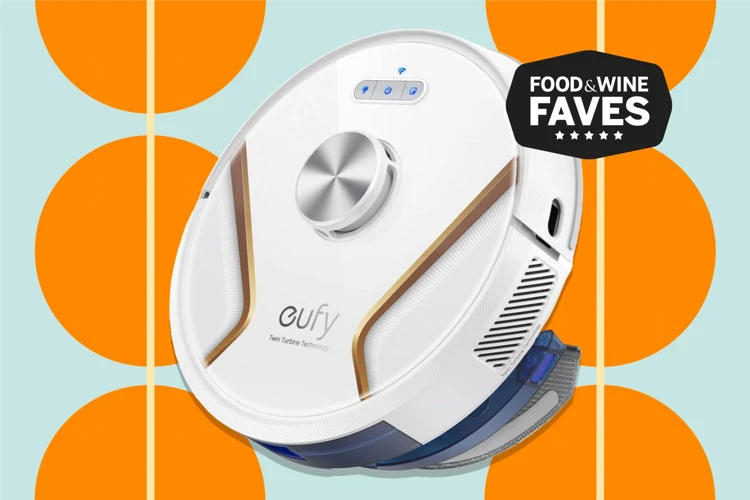
A smart vacuum cleaner with a quality filtration system is the perfect solution for keeping your living space clean and healthy. It has been designed to work efficiently and effectively by using advanced technology to collect and dispose of all types of dirt, dust, and debris.
1. HEPA Filters and their Importance
One of the most important features of a smart vacuum cleaner with a quality filtration system is the HEPA (High-Efficiency Particulate Air) filter. This type of filter is designed to remove even the tiniest particles from the air, such as pollen and pet dander, which can cause allergies and respiratory problems.
The HEPA filter is made up of multiple layers of fine mesh that trap particles as small as 0.3 microns, ensuring that the air you breathe is clean and fresh. It is important to note that not all vacuum cleaners have HEPA filters, so be sure to look for this feature when purchasing a smart vacuum cleaner.
2. Multi-Stage Filtration Process
Along with the HEPA filter, a smart vacuum cleaner with a quality filtration system usually includes a multi-stage filtration process that enhances its cleaning performance. This process includes the use of pre-motor and post-motor filters that trap dust and dirt before they reach the motor and exhaust system.
During the cleaning process, the vacuum cleaner sucks in dust and debris, which pass through the pre-motor filter, trapping larger particles. The air then passes through the HEPA filter, removing any remaining particles. The clean air is then released through the exhaust system.
3. Smart Sensors and Navigation Technology
In addition to the advanced filtration system, a smart vacuum cleaner is equipped with smart sensors and navigation technology that helps it clean more efficiently. These sensors help the vacuum cleaner detect obstacles and navigate around furniture and other objects in your home.
Some smart vacuum cleaners even have mapping technology that allows them to create a map of your home to clean more effectively. They use advanced algorithms to calculate the most efficient cleaning path, ensuring that every corner of your home is thoroughly cleaned.
A smart vacuum cleaner with a quality filtration system is an essential tool for maintaining a clean and healthy living space. With its advanced features, including HEPA filters, multi-stage filtration process, and smart sensors and navigation technology, it can clean thoroughly and efficiently, leaving your home dust-free and allergen-free.
1. HEPA Filters and their Importance
One of the key components of a high-performance filtration system for a smart vacuum cleaner is the HEPA filter. HEPA stands for High-Efficiency Particulate Air and is a type of filter that is capable of capturing extremely small particles that other filters may miss.
HEPA filters are highly effective in removing allergens and pollutants from the air, including dust mites, pollen, pet dander, and even some types of bacteria and viruses. This is especially beneficial for those with allergies or respiratory issues, as these particles can aggravate symptoms and contribute to poor indoor air quality.
The importance of HEPA filters cannot be overstated when it comes to the overall effectiveness of a smart vacuum cleaner’s filtration system. Without a high-quality HEPA filter, particles can simply be redistributed back into the air during the cleaning process, negating any benefits of using a vacuum cleaner in the first place.
HEPA filters are made up of a dense mat of fine fibers that trap particles as they pass through the filter. The fibers are arranged in a way that allows air to pass through freely, while also capturing particles as small as 0.3 microns – smaller than the width of a human hair.
It is important to note that not all HEPA filters are created equal. For a filter to be considered true HEPA, it must meet certain standards set by the United States Department of Energy. These standards require that a HEPA filter be capable of removing at least 99.97% of particles that are 0.3 microns or larger.
When choosing a smart vacuum cleaner with a HEPA filter, it is important to ensure that the filter meets the proper standards and is designed to work effectively with the vacuum cleaner’s specific filtration system. This will help to ensure that the vacuum cleaner is able to provide the maximum benefits in terms of air quality and cleaning performance.
2. Multi-Stage Filtration Process
When it comes to keeping your home clean, a vacuum cleaner is an essential tool. But with a smart vacuum cleaner that has a high-performance filtration system, you can take your cleaning game to the next level. Smart vacuum cleaners with multi-stage filtration processes are particularly effective in removing even the tiniest of dirt particles and harmful pollutants from the air inside your home.
The first stage of the multi-stage filtration process is usually a pre-filter that captures large particles like dirt, hair, and pet fur. This pre-filter can be either reusable or disposable, depending on the model of the vacuum cleaner that you choose.
The second stage of the process typically involves a HEPA filter, which is the most important component in a smart vacuum’s filtration system. HEPA filters are designed to capture even the smallest of dust and allergen particles, preventing them from recirculating in the air. By doing so, HEPA filters can help reduce the risk of allergies, asthma attacks, and other respiratory problems caused by indoor air pollution.
Finally, some smart vacuum cleaners also include a third filtration stage, such as an activated carbon filter or UV-C light, which help to remove odors and germs from the air. These extra features can be particularly beneficial for households with pets, small children, or people with allergies and sensitivities to certain chemicals.
The multi-stage filtration process in smart vacuum cleaners is a key factor in enhancing indoor air quality and ensuring that your home is free of dust, dirt, and harmful pollutants. When choosing a smart vacuum cleaner, be sure to look for one that has a high-quality filtration system with multiple stages to ensure that your home stays clean and safe.
3. Smart Sensors and Navigation Technology
Smart sensors and navigation technology are essential components of modern smart vacuum cleaners with advanced filtration systems. These features make it possible for the cleaner to navigate through tight spaces and avoid obstacles while cleaning with precision and efficiency.
Sensors: Smart vacuum cleaners with advanced filtration systems are equipped with various sensors that help them navigate around obstacles and accurately map out your home. The sensors detect when the cleaner is approaching an obstacle, such as furniture, walls, or stairs, and help it navigate around them. Some vacuum cleaners even come with cliff sensors that detect when the cleaner is about to fall down the stairs and automatically adjust its cleaning path.
Navigation: Navigation technology is another essential feature of modern smart vacuum cleaners. This technology allows the cleaner to create a map of your home and understand its layout. It then uses this map to determine the best cleaning path and avoid re-cleaning areas that have already been cleaned. This helps to save time and ensures that all areas of your home are cleaned thoroughly.
Smart Features: In addition to sensors and navigation technology, many smart vacuum cleaners also come with other smart features, such as voice control, mobile app control, and scheduling. Voice control allows you to control your vacuum cleaner with your voice, while mobile app control allows you to control it using your smartphone or tablet. Scheduling allows you to set the cleaner to start cleaning at a specific time, even when you’re not at home.
Smart sensors and navigation technology are essential components of modern smart vacuum cleaners with advanced filtration systems. These features allow the cleaner to navigate through tight spaces and avoid obstacles, resulting in more efficient and accurate cleaning. With the added convenience of smart features, smart vacuum cleaners are a must-have in any modern home.
Choosing the Right Smart Vacuum Cleaner with Advanced Filtration System
When it comes to choosing a smart vacuum cleaner with an advanced filtration system, there are several factors to consider to ensure that you get the best possible value for your money. Here are some tips to help you make the right decision:
1. Consider Your Cleaning Needs
Before you start shopping for a smart vacuum cleaner, you should assess your cleaning needs. Do you have pets that shed a lot of hair? Are you dealing with a high level of dust and allergens in your home? Do you need a vacuum cleaner that can handle multiple types of flooring, such as carpets, hardwood, and tile? By answering these questions, you can narrow down your options and focus on vacuum cleaners that are designed to meet your specific needs.
2. Assess Filtration Technology
The effectiveness of a vacuum cleaner’s filtration system is a critical factor to consider. Look for vacuum cleaners that use high-quality filters, such as HEPA (High-Efficiency Particulate Air) filters, which can capture even the smallest particles and allergens. Also, consider the number of filtration stages that the vacuum cleaner uses. A multi-stage filtration system can ensure that all contaminants are removed from your home’s air.
3. Compare Features and Options
Smart vacuum cleaners with advanced filtration systems come with a vast range of features and options. Some models have Wi-Fi connectivity and smart sensors that allow you to control them with your mobile phone. Others come with advanced navigation technology that enables them to map out your home and clean every corner of your home effectively. You’ll want to weigh the features and options against your budget to determine which vacuum cleaner offers the best value for your money.
By following these tips, you can choose the best smart vacuum cleaner with an advanced filtration system for your home. Keep in mind that your family’s health and wellbeing should always come first, so invest in a high-quality vacuum cleaner that can maintain a healthy indoor environment.
1. Consider Your Cleaning Needs
When choosing the right smart vacuum cleaner with an advanced filtration system, it’s important to consider your cleaning needs. Do you have pets? Do you have allergies? How many floors do you need to clean? These are all important factors to consider before making a decision.
Pet Owners: If you have pets, you’ll want to look for a smart vacuum cleaner with a strong suction power and a high-performance filtration system. Pet hair can be notoriously difficult to clean, so look for vacuum cleaners with a powerful motor and brush roll that can effectively remove hair from carpets and furniture. Additionally, consider a vacuum cleaner that has a HEPA filter to capture pet dander and other allergens.
Allergy Sufferers: If you suffer from allergies, you’ll want a smart vacuum cleaner with a high-performance filtration system that can capture even the smallest of allergens. Look for a vacuum that has a HEPA filter, as these filters are designed to capture 99.97% of particles that are 0.3 microns or larger. Additionally, consider a vacuum that has a sealed system to prevent allergens from escaping back into the air.
Multi-Level Homes: If you have a multi-level home, you’ll want to consider the weight and versatility of the vacuum. Look for a vacuum that is lightweight and easy to move from floor to floor. Additionally, consider a vacuum that has a long battery life and can transition from hard floors to carpets seamlessly.
When considering your cleaning needs, it’s important to understand what features are essential for your home. By doing so, you can select the right vacuum cleaner with advanced filtration to clean your floors effectively and efficiently.
2. Assess Filtration Technology
When it comes to choosing a smart vacuum cleaner with a high-performance filtration system, it’s crucial to assess the filtration technology used. Not all filtration systems are created equal, and each has its strengths and weaknesses.
HEPA Filters: HEPA filters are a popular and effective type of filtration technology used in smart vacuum cleaners. These filters can capture up to 99.97% of particles as small as 0.3 microns, including pollen, pet dander, and dust mites. HEPA filters are especially useful for people with allergies or respiratory issues. It’s important to note that not all HEPA filters are the same, and some may not meet the necessary standards for true HEPA filtration.
Cyclonic Filtration: Cyclonic filtration is another popular technology that smart vacuum cleaners use. This technology uses centrifugal force to separate dust and dirt particles from the air before filtering them. Cyclonic filtration can be effective in capturing large particles, but it may not capture smaller particles like allergens.
UV-C Light Filtration: UV-C light has been shown to be effective in killing bacteria and viruses, making it a useful addition to some smart vacuum cleaners’ filtration systems. However, UV-C light filters may not capture other types of particles like dust or pet hair.
Carbon Filters: Carbon filters are designed to capture odors and VOCs (volatile organic compounds) by using activated charcoal. While carbon filters can be effective in reducing unpleasant odors, they may not capture other types of particles.
When assessing filtration technology, it’s important to consider which types of particles you want to capture and which filtration technology is best suited for your needs. Consider consulting with a professional or doing research to determine which smart vacuum cleaner with the appropriate filtration technology would align best with your individual preferences and wants.
3. Compare Features and Options
When choosing a smart vacuum cleaner with an advanced filtration system, it’s important to compare the different features and options available on the market. One important factor to consider is the suction power of the vacuum. High suction power ensures that the vacuum can pick up dirt and debris effectively, while a low suction power may leave behind particles.
Another important consideration is whether the vacuum has a bagless or bagged design. While bagless vacuums are more environmentally friendly and convenient, bagged designs can be more hygienic as they prevent dust and debris from flying back into the air when the bag is emptied.
It’s also important to look for vacuums with HEPA filtration, which captures microscopic particles of dust, pollen, and other irritants. Some vacuums feature activated carbon filters that can trap odors from pets, cooking, and other sources.
Intelligent navigation technology is another important feature to consider. Look for vacuums with smart sensors that can detect obstacles and adjust the vacuum’s movements accordingly. Some vacuums also feature mapping technology that creates a layout of your home and helps the vacuum navigate more efficiently.
Additional features to consider include run time and charging time, as well as noise levels. Vacuums with a longer battery life can clean larger areas before needing to recharge, while quieter vacuums won’t disturb your home’s peaceful atmosphere.
Ultimately, the best vacuum for you will depend on your individual needs and preferences. Take the time to research and compare the different features and options available so you can find a smart vacuum cleaner with an advanced filtration system that meets your cleaning needs and fits into your lifestyle.
Conclusion
In conclusion, investing in a smart vacuum cleaner with a high-performance filtration system is a wise decision for any homeowner looking to maintain a healthy and clean living environment. With the advanced features and technology found in these modern vacuums, you can achieve efficient and reliable cleaning performance while protecting the health of your loved ones.
Remember, indoor air pollution is a major concern, and it can have long-term health effects on individuals exposed to it. By using a smart vacuum cleaner with a quality filtration system, you can eliminate allergens and pollutants from your living space, thereby reducing the health risks associated with poor indoor air quality.
Moreover, the use of a smart vacuum cleaner with advanced filtration technology not only enhances the air quality but also keeps your home surfaces and fabrics free from dirt and stains. The multi-stage filtration process ensures that even the tiniest debris and particles are removed, providing a thorough and comprehensive cleaning experience.
When it comes to choosing the right smart vacuum cleaner, it is essential to consider your specific cleaning needs, compare the filtration technology used, and assess the various features and options available.
So, make the investment today, and reap the benefits of a clean and healthy living space with a smart vacuum cleaner equipped with a high-performance filtration system. It’s a small price to pay for a significant and long-lasting impact on your health and well-being.
Frequently Asked Questions
How does a smart vacuum cleaner work?
A smart vacuum cleaner uses sensors and advanced navigation technology to detect and clean dirt, dust, and allergens from indoor surfaces.
A High-Performance Filtration System is a technology that removes microparticles and allergens from the air to ensure maximum indoor air quality.
What are the Benefits of having a Smart Vacuum Cleaner with a Good Filtration System?
A smart vacuum cleaner with a good filtration system offers enhanced indoor air quality, elimination of allergens and pollutants, reduces health risks, protects home surfaces and fabrics, and reliable and efficient cleaning performance.
What is a HEPA filter?
A HEPA filter is a type of filter that uses a mesh to trap microparticles and allergens in the air.
Why is the air quality in my home important?
The air quality in your home can affect your overall health and well-being. Poor air quality can lead to respiratory problems, allergies, and other health issues.
How many stages does a Multi-Stage Filtration Process have?
A Multi-Stage Filtration Process typically has three or more stages to filter out microparticles and allergens from the air.
What is Navigation Technology?
Navigation Technology is an advanced technology used in smart vacuum cleaners that helps the vacuum navigate around furniture and other obstacles to ensure maximum cleaning coverage.
What type of surfaces can a smart vacuum cleaner clean?
A smart vacuum cleaner can clean a variety of surfaces, including carpets, hardwood floors, tile, and laminate.
What features should I look for when choosing a Smart Vacuum Cleaner with Advanced Filtration System?
When choosing a smart vacuum cleaner with advanced filtration system, consider your cleaning needs, assess the filtration technology, and compare features and options (such as battery life, suction power, and noise level).
Why is it important to eliminate allergens and pollutants from the air?
Eliminating allergens and pollutants from the air can reduce the risk of allergies, respiratory problems, and other health issues caused by poor indoor air quality.

